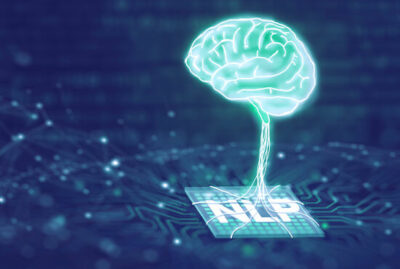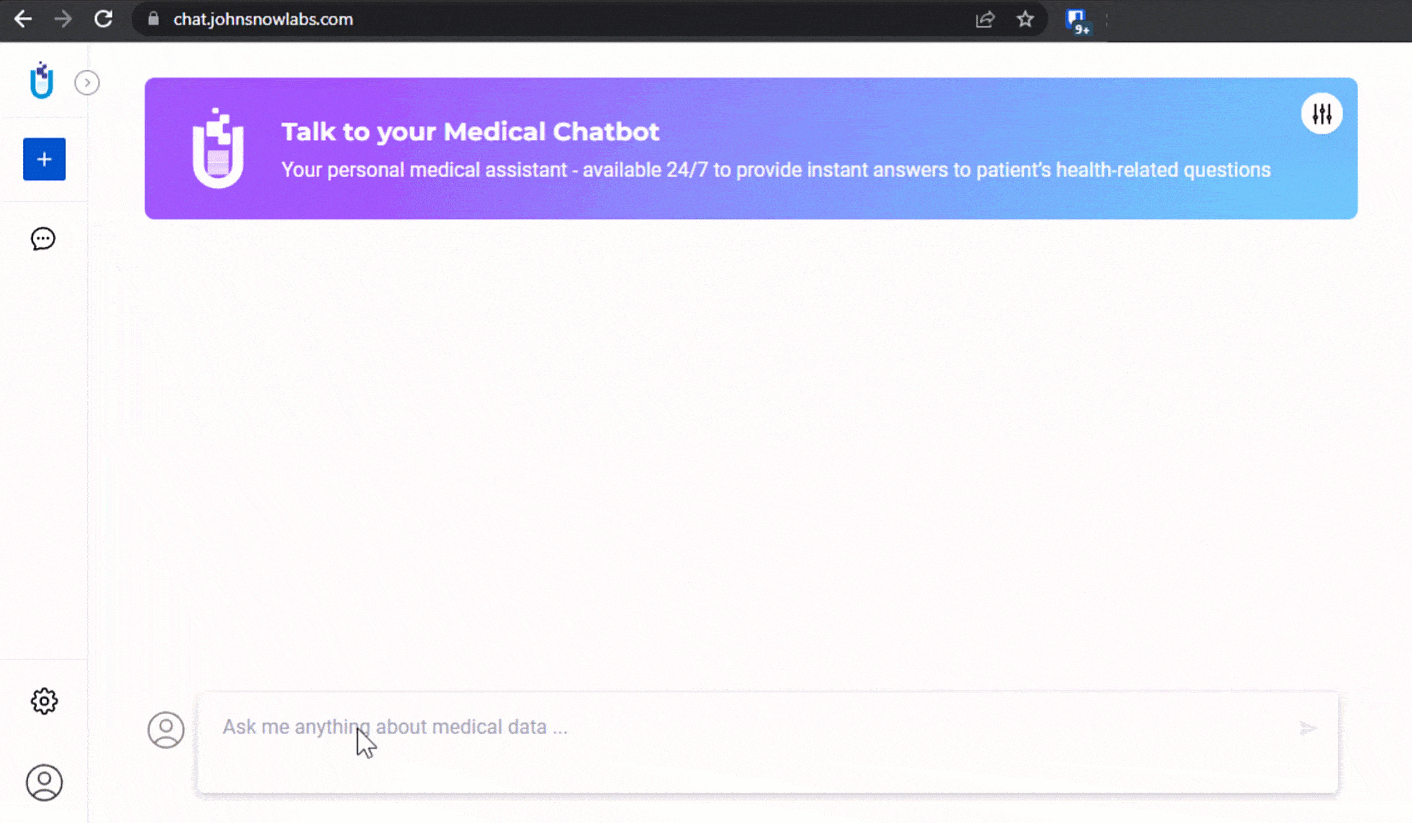Engage in an interactive dialogue with a medical chatbot that understands and replies to a wide range of health-related queries, from simple questions to complex discussions. Get informative responses built on validated research results adapted to you preferred conversation style and tone of voice.
Medical Chatbot is powered by John Snow Labs proprietary LLMs
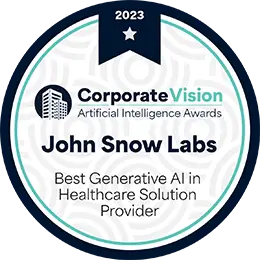

What Makes this AI Different?
- Proprietary Medical Large Language Model
- Medical Conversations
- Literature Review
- Document Q&A
- Medical Agents
- Medical Knowledge Bases (PubMed, medRxiv, bioRxiv…)
- Custom Knowledge Bases
- Daily Updates
- Explainable Results
- Cite & Explore References
- SaaS or On Premise
- Designed to Scale
- Works on Your Documents
- Role Based Access
- Team Management
- API Access
Medical Chatbot for Healthcare Professionals
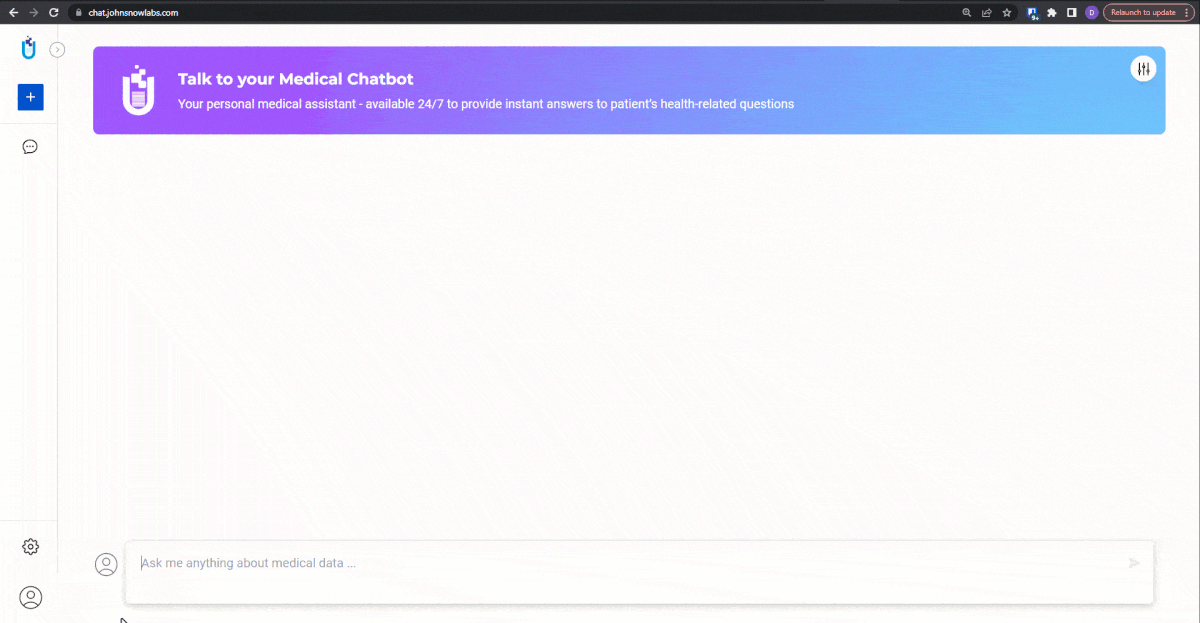
Literature Reviews
Document Q&A
Role Based Access to Private Knowledge Bases
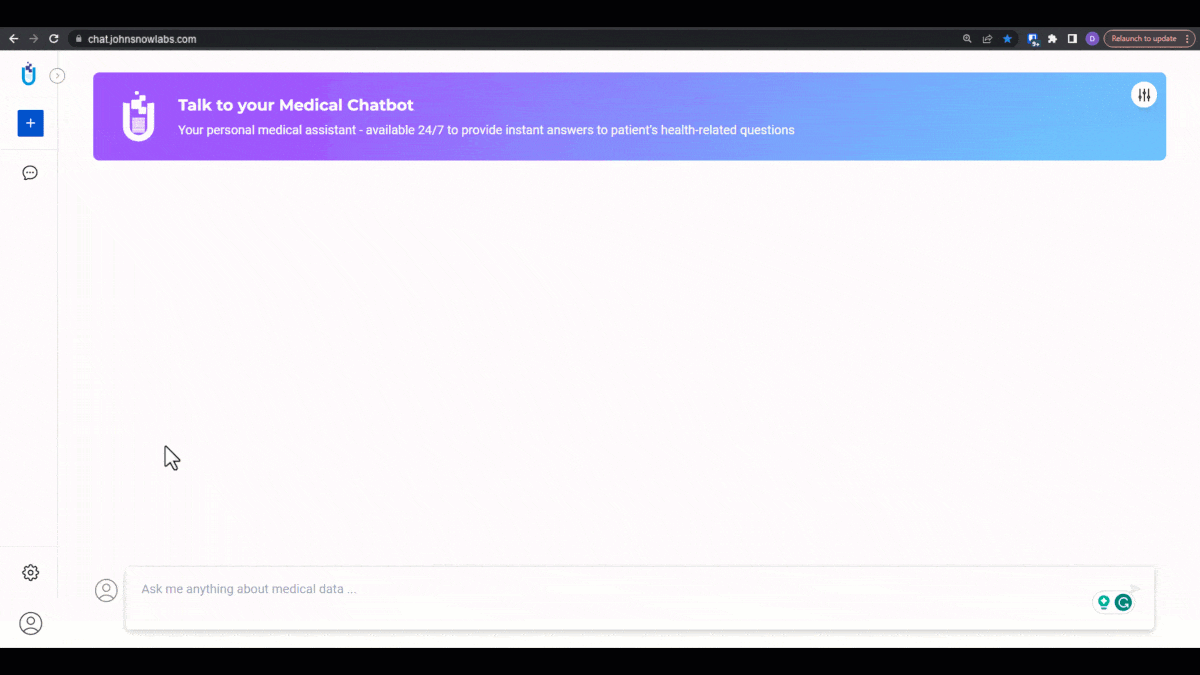
Query Your Patients’ Data
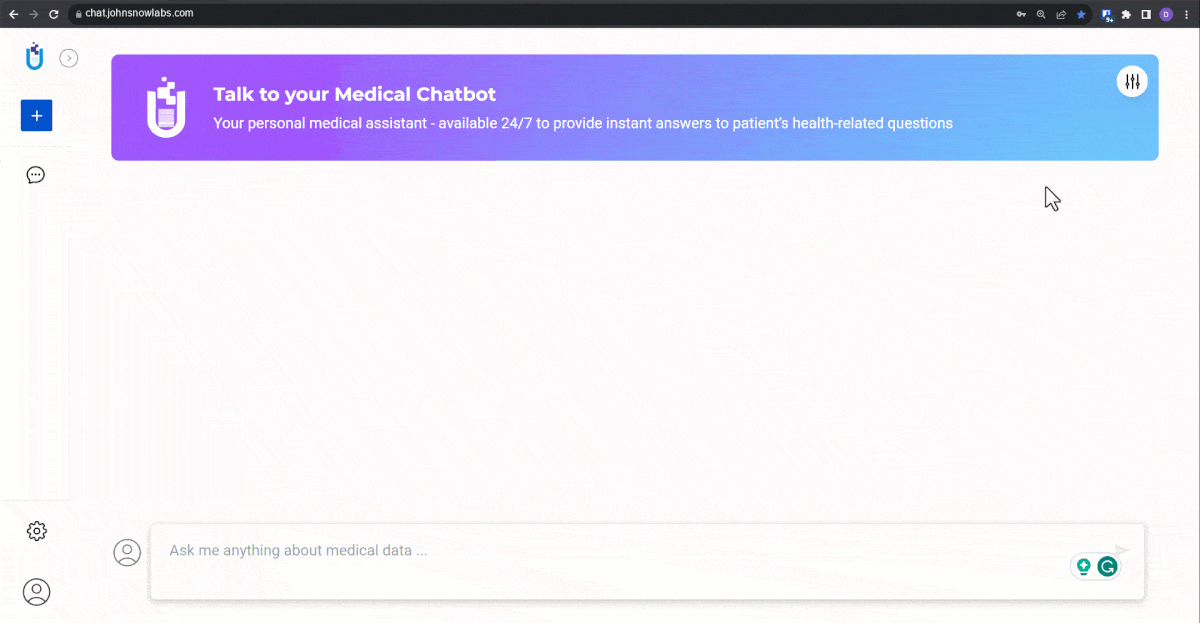
Medical Knowledge At Your Fingertips
Includes validated medical research articles and datasets from multiple reliable sources.
Daily updates of new medical results, clinical trials and terminologies.
Ready to process millions or billions of documents. Scale the cluster to fit your needs.
Get Started
Professional
- Proprietary Large Language Model tuned for Healthcare
- Medical Knowledge Updated Daily
- Medical Conversations
- Smart Ranking of References
- Safeguards
- Prevent Hallucinations
- Customizable Tone of Voice
- Search Bookmarks and Responses
Introducing the Medical Research Chatbot
Schedule a call to get the Enterprise version deployed on your own infrastructure.
Frequently Asked Questions
A medical chatbot is a type of conversational AI that uses natural language processing (NLP) to interact with users and provide them with medical information, advice, or support. They can be used for a variety of purposes, including:
- Answer general medical questions about diseases, health conditions, and treatment options;
- Research specific healthcare topics. A medical chatbot can provide educational materials on a diverse range of health topics
- Summarize medical text. When presented with complex medical documents or articles, a medical AI chatbot can summarize the key points, saving you time and effort in understanding the information.
Medical chatbots are becoming increasingly common as they offer a convenient and accessible way to access healthcare information. They can be used by health professionals, researchers, or patients regardless of their location or language skills.
There are several types of medical chatbots according to the functionalities they provide, or based on the application, and technologies they use:
- Informational Chatbots: These chatbots primarily provide health-related information to patients. They can answer general medical queries, and provide information about symptoms, diseases, medications, and treatments. Informational chatbots are often used on hospital websites and health information portals.
- Medical Research Assistants: These chatbots allow medical professionals to quickly get evidence-based answers, with cited sources, on the latest medical research results. They are a great resource for users who need to delve deeper into medical conditions, interventions, outcomes, or preventive measures. They are often able to summarize complex medical documents or articles, and extract the key points, saving you time and effort in understanding the information.
- Diagnostic Chatbots: These are more advanced and are designed to assist in diagnosing medical conditions. They ask users about their symptoms and medical history and use AI algorithms to suggest possible diagnoses. However, they do not replace professional medical advice but rather serve as a preliminary consultation tool.
- Treatment-Assistance Chatbots: These chatbots assist patients with treatment plans. They can remind patients to take their medication, follow their treatment schedules, and even provide guidance on lifestyle changes that could aid in the recovery or management of chronic conditions.
- Mental Health Chatbots: These are specialized chatbots focused on mental health support. They can offer therapeutic conversations, help users manage stress, anxiety, or depression, and provide cognitive behavioral therapy (CBT) techniques. However, they are not a substitute for professional mental health care.
- Patient Engagement and Monitoring Chatbots: They engage with patients during their care journey, monitoring health progress, providing reminders for appointments or medication, and answering queries related to their care plan. They are used by healthcare providers to maintain consistent patient engagement and monitoring.
- Administrative Task Chatbots: These chatbots handle administrative tasks such as appointment scheduling, patient data entry, insurance queries, and billing. They help reduce the administrative burden on healthcare staff and improve operational efficiency.
- Health Coaching Chatbots: They offer guidance and support for lifestyle changes, such as diet, exercise, and wellness activities. They are often used in preventive healthcare and wellness programs.
- Emergency Response Chatbots: These are designed to provide immediate assistance in emergency situations. They can guide users on what steps to take in a medical emergency and provide information on the nearest healthcare facilities.
Each type of AI medical chatbot employs a range of technologies like natural language processing (NLP), machine learning, and sometimes even AI-driven predictive analytics, ensuring they are effective and user-friendly. It's crucial to note that while medical chatbots offer significant benefits, they are tools to support healthcare services and not replacements for professional medical consultation and care. Medical chatbots are a valuable tool for both patients and healthcare providers. They can help to improve access to healthcare, reduce wait times, and improve patient outcomes. As technology continues to advance, we can expect to see even more innovative and sophisticated medical chatbots in the future.
Large language models (LLMs) have revolutionized the field of chatbots, enabling them to provide more natural, sophisticated and informative interactions. In the realm of healthcare, LLM healthcare chatbots offer a promising avenue for enhancing patient care and streamlining administrative workflows.
- Providing Patient Education and Information. LLM healthcare chatbots can serve as valuable resources for patients seeking information about their health conditions, treatment options, and preventive measures. They can access and process vast amounts of medical literature, providing accurate and up-to-date information in a user-friendly format. These chatbots can also dispel misinformation and address common misconceptions, empowering patients to make informed decisions about their healthcare.
- Triaging Patients and Referring to Appropriate Care. LLM healthcare chatbots can effectively triage patients, identifying urgent cases and connecting them with the necessary medical attention promptly. By assessing patients' symptoms, medical history, and overall health status, these chatbots can prioritize cases that require immediate intervention and guide patients toward the most suitable healthcare providers.
- Supporting Mental Health and Behavioral Well-being. Mental health and behavioral well-being are integral aspects of overall health. LLM healthcare chatbots can provide personalized support for patients experiencing psychological distress, offering coping strategies, mindfulness exercises, and emotional guidance. These chatbots can also connect patients with mental health professionals when more specialized care is required.
- Managing Chronic Conditions and Medication Reminders. LLM healthcare chatbots can assist patients with chronic conditions in managing their health effectively. By tracking their symptoms, medication adherence, and lifestyle factors, these chatbots can provide personalized reminders, support adherence to treatment plans, and identify potential complications early on.
- Streamlining Administrative Workflows. LLM healthcare chatbots can automate various administrative tasks, such as appointment scheduling, pre-authorization requests, and prescription refills. By handling these routine tasks, chatbots can free up healthcare professionals to focus on direct patient care, improving efficiency and reducing administrative burden.
- Enhancing Patient Satisfaction and Engagement. LLM healthcare chatbots can enhance patient satisfaction and engagement by providing timely, accurate, and personalized information. Their ability to interact in a natural and empathetic manner can foster a sense of connection and trust, encouraging patients to seek further information and guidance from healthcare providers.
As LLM technology continues to evolve, the potential applications of LLM healthcare chatbots are expanding. These AI chatbots for healthcare could potentially be used for:
- Conducting virtual consultations with patients
- Providing personalized health assessments
- Identifying risk factors for chronic conditions
- Developing customized treatment plans
- Guiding patients through rehabilitation programs
LLM healthcare chatbots hold immense promise for revolutionizing the healthcare landscape, improving patient care, promoting well-being, and streamlining administrative processes. As these technologies continue to mature, their impact on healthcare is expected to grow significantly.
Healthcare providers need medical chatbots for several reasons:
- Stay Up-To-Date With The Latest Research Results: Medical chatbots can be configured to deliver regular updates on recent research papers, journal articles, and clinical trial outcomes relevant to a medical professional's specialty. The chatbots can also analyze and summarize key findings from new studies, providing a concise overview of the latest research.
- Interactive Learning: Medical professionals can engage in interactive learning sessions with the chatbot. They can ask specific questions about new treatments, drugs, or procedures, and the chatbot can provide detailed explanations, pulling information from recent studies or medical databases.
- Clinical Decision Support: For more advanced applications, chatbots can assist in clinical decision-making by providing information from the latest research that may impact treatment options and patient care strategies.
- Summarization of Complex Research: Chatbots can summarize complex research papers, making them more accessible and easier to understand. This feature is particularly useful for quickly grasping the key points of extensive or highly technical studies.
- Alerts on Drug Interactions and New Medications: Keeping track of the latest pharmaceutical developments, including new medications and their interactions, is crucial. Chatbots can provide timely updates in this area.
- Compliance and Best Practices: Chatbots can also update medical professionals about changes in guidelines, standards, and regulatory requirements, ensuring that practices remain compliant and aligned with current best practices.
- To reduce the burden on healthcare providers: Medical chatbots can automate many of the routine tasks that healthcare providers currently do, such as answering frequently asked questions, scheduling appointments, and refilling prescriptions. This frees up healthcare providers to spend more time with their patients and focus on more complex medical care.
- To reduce healthcare costs: Medical chatbots can help reduce healthcare costs by reducing the need for unnecessary doctor visits and by improving patient outcomes. For example, chatbots can help patients to better understand their conditions and to make better choices about their health care.
In using medical chatbots for these purposes, it's important for medical professionals to critically evaluate the information provided, considering the source and its relevance to their practice. While chatbots are powerful tools for information dissemination and learning, they complement but do not replace thorough research and professional judgment.
Medical chatbots offer a range of benefits for patients, significantly enhancing their healthcare experience. Here are some key advantages:
- Immediate Access to Healthcare Information: Chatbots provide instant responses to patients' queries, which is particularly beneficial for non-urgent health-related questions. This immediate access to information can be reassuring and informative for patients.
- 24/7 Availability: Unlike traditional healthcare settings that may have specific operating hours, chatbots are available around the clock. This is especially useful for addressing concerns that may arise outside of normal clinic hours.
- Enhanced Patient Engagement: By providing personalized interactions and reminders for medication, appointments, and follow-up care, chatbots can enhance patient engagement and adherence to treatment plans.
- Reduced Waiting Times and Improved Efficiency: Chatbots can handle routine inquiries and administrative tasks (like appointment scheduling), reducing waiting times and improving overall service efficiency in healthcare facilities.
- Anonymity and Privacy: For patients who might feel uncomfortable discussing sensitive health issues, chatbots offer a degree of anonymity, encouraging them to seek information they might otherwise avoid.
- Cost-Effective: By automating various tasks and providing initial consultation services, chatbots can potentially reduce the costs associated with healthcare services for patients.
- Accessible Health Education: Chatbots can educate patients about their health conditions, treatments, and lifestyle modifications, thereby promoting better health literacy and self-care practices.
- Support for Chronic Disease Management: For patients with chronic conditions, chatbots can assist in regular monitoring, providing reminders for medication, and offering tips for managing their condition.
- Mental Health Support: While not a substitute for professional therapy, chatbots can offer support and resources for mental health, helping patients cope with stress, anxiety, and depression.
- Language and Communication Accessibility: Chatbots can often translate medical information into different languages or simplify complex medical jargon, making health information more accessible to diverse patient populations.
- Reduced Risk of Infection: Particularly in scenarios like a pandemic, chatbots provide a means of receiving healthcare guidance without the risk of in-person interactions.
While these benefits highlight the potential of medical chatbots in enhancing patient care and experience, it is crucial to remember that they are tools designed to support and not replace the expertise of healthcare professionals. Patients should always be encouraged to seek professional medical advice for accurate diagnoses and treatment plans.
Building a LLM based healthcare chatbot is a complex task that involves several steps:
- 1. Define the scope and purpose of the chatbot: Clearly define the specific tasks and functionalities that the chatbot will perform. Identify the target audience and their needs.
- 2. Gather and prepare medical data: Collect a comprehensive corpus of medical text, including medical literature, patient records, and clinical guidelines. Ensure the data is accurate, up-to-date, and relevant to the chatbot's purpose.
- 3. Train an LLM model: Choose an appropriate LLM model, such as GPT-3 or Megatron-Turing NLG, that is capable of handling medical language and generating informative responses. Train the model on the prepared medical data.
- 4. Integrate the LLM with a chatbot platform: Choose a chatbot platform that can interact with the LLM model and provide a user-friendly interface for patients. Integrate the LLM into the chatbot platform's conversational flow.
- 5. Implement natural language processing (NLP) techniques: Employ NLP techniques to process user input, understand the intent behind the query, and extract relevant information from the medical data.
- 6. Develop error handling and safety mechanisms: Implement robust error handling mechanisms to address unexpected inputs or incorrect responses from the LLM. Establish safety measures to prevent the chatbot from providing misleading or harmful information.
- 7. Conduct testing and refinement: Extensively test the chatbot with a diverse range of user scenarios. Gather feedback and refine the chatbot's responses, NLP techniques, and overall user experience.
- 8. Deploy and monitor the chatbot: Deploy the chatbot to the intended platform or healthcare setting. Continuously monitor its performance, gather user feedback, and make necessary updates to improve its effectiveness.
The expense of developing a healthcare chatbot can vary significantly, influenced by several key factors such as the bot's complexity, the target features, and the degree of customization required.
For elementary chatbots that offer basic functionalities like responding to FAQs, scheduling appointments, and managing prescription refills, costs can range from approximately $10,000 to $50,000. These chatbots typically operate on simpler platforms and do not require advanced customization or sophisticated features.
On the other hand, more sophisticated chatbots, equipped with intricate features and a higher degree of personalization, can cost between $150,000 and $250,000, potentially even more. These advanced chatbots are capable of delivering tailored health advice, diagnosing and treating various conditions, and facilitating virtual consultations with patients. Such systems often integrate complex AI technologies and necessitate integration with multiple healthcare systems, contributing to the higher cost bracket.
In addition to the initial development cost, there are also ongoing costs associated with maintaining and updating the chatbot, such as data storage, server hosting, and bug fixing. These costs can typically range from $5,000 to $20,000 per year.
If you plan to tune and host your own custom Large Language Model (LLM) for the medical chatbot you need to consider additional costs. As an estimate, hosting a moderately complex LLM could start from several hundred to a few thousand dollars per month, escalating based on factors such as the cloud hosting services you will use, the model size and complexity, data storage and management requirements, maintenance and updates requirements, compliance and security, scalability, etc.























